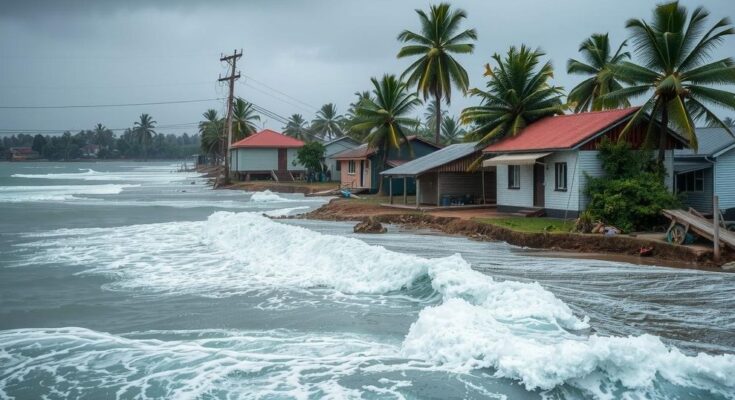Tropical Cyclone Dikeledi has claimed three lives and displaced over 5,000 in Madagascar. The IFRC confirmed the fatalities as the cyclone moved southwest after crossing from the Mozambique Channel. In Mayotte, damage was minimal despite prior alerts. This cyclone follows Cyclone Chido, which had devastating effects in the region, prompting concerns over disaster readiness.
Tropical Cyclone Dikeledi has resulted in three fatalities and displaced over 5,000 individuals in Madagascar, as reported by the International Federation of Red Cross and Red Crescent Societies (IFRC) Africa and the National Office for Risk and Disaster Management (BNGRC). The cyclone, after crossing the Mozambique Channel, is now moving southwestward, and while no immediate impact is anticipated, adverse weather conditions are expected to intensify. The IFRC confirmed the loss of life and the affected population, advising communities to remain cautious and adhere to safety guidelines.
Prior to its landfall in Madagascar, Cyclone Dikeledi passed close to Mayotte, a French overseas territory, where it prompted a red alert due to weather warnings. Despite initial fears, the impact on Mayotte was minimal, limited to minor flooding and disruptions without severe infrastructure damage. Local authorities had advised residents to stay indoors as a precautionary measure against the storm. In response to the developing situation, the IFRC and local Red Cross teams are actively monitoring the storm’s trajectory and potential impacts.
This cyclone’s emergence follows the devastation wrought by Cyclone Chido just a month prior, which caused extensive destruction in Mayotte and Madagascar. Cyclone Chido resulted in at least 35 fatalities, approximately 2,500 injuries, and the displacement of around 100,000 people, severely hindering rescue and relief operations after it struck on December 14, 2024. Given the repeated adverse weather events in the region, local authorities and international organizations are prioritizing community safety and disaster preparation moving forward.
The occurrence of Tropical Cyclone Dikeledi highlights the vulnerability of Madagascar and surrounding regions to severe weather patterns. Historically, cyclones forming in the Indian Ocean have consistently posed significant risks to island communities, particularly those situated in the path of storms. In recent months, the recurrence of cyclones has underscored the need for effective disaster management strategies and humanitarian response efforts. The response to cyclones, such as the recent Cyclone Chido, emphasizes the importance of preparedness and ongoing monitoring by organizations like the IFRC and local agencies.
In summary, Cyclone Dikeledi has tragically led to the loss of three lives and displaced thousands in Madagascar, raising concerns about the region’s readiness for natural disasters. The cyclone’s route after impacting Mayotte suggests that vigilance is crucial as adverse weather conditions could persist. The importance of coordinated disaster management efforts and community preparedness is evident, especially in light of recent cyclonic events that have severely impacted local populations. Continuous monitoring and adherence to safety protocols are essential to mitigate further risks.
Original Source: www.aa.com.tr




